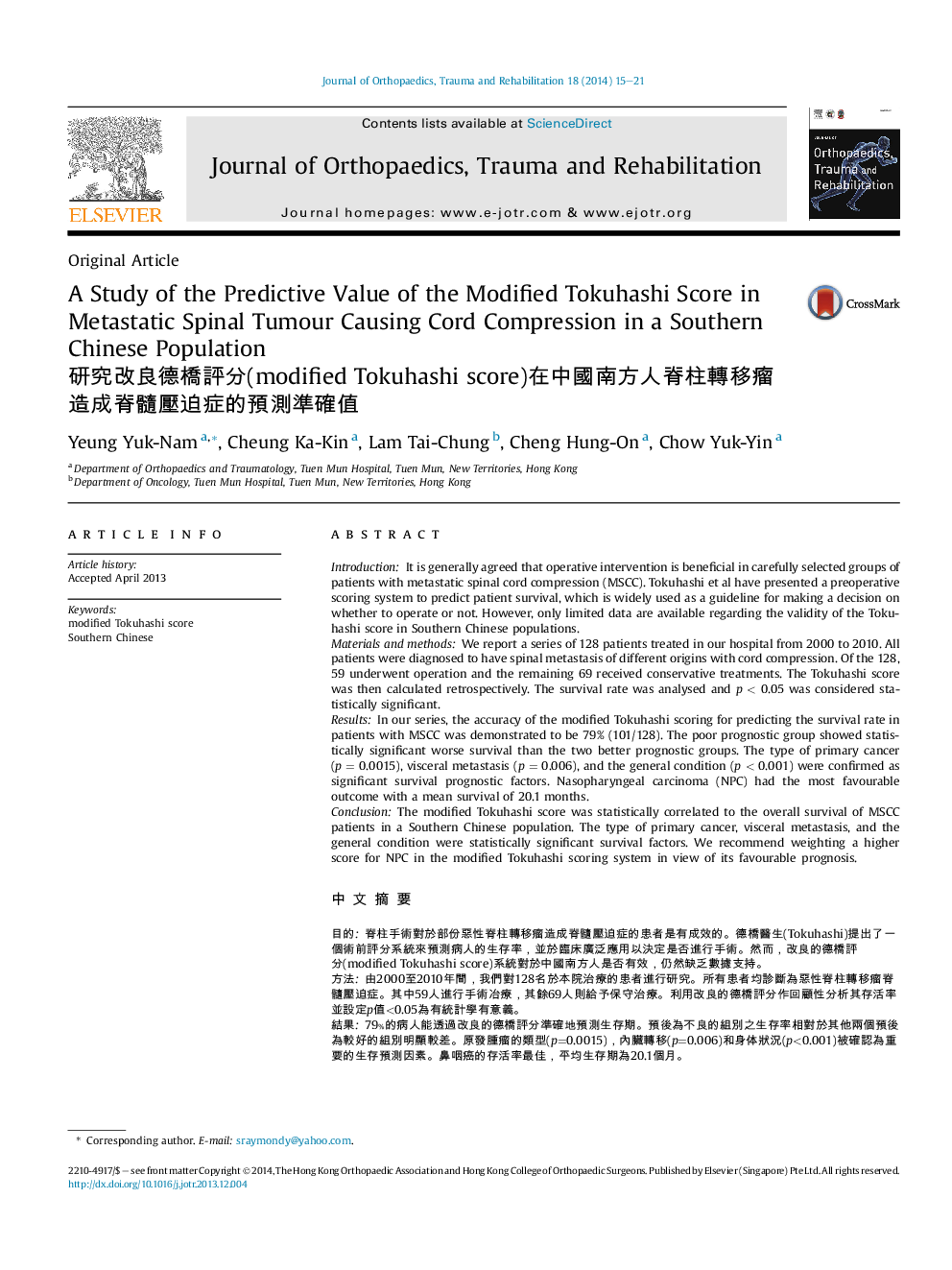| Article ID | Journal | Published Year | Pages | File Type |
|---|---|---|---|---|
| 6210812 | Journal of Orthopaedics, Trauma and Rehabilitation | 2014 | 7 Pages |
IntroductionIt is generally agreed that operative intervention is beneficial in carefully selected groups of patients with metastatic spinal cord compression (MSCC). Tokuhashi et al have presented a preoperative scoring system to predict patient survival, which is widely used as a guideline for making a decision on whether to operate or not. However, only limited data are available regarding the validity of the Tokuhashi score in Southern Chinese populations.Materials and methodsWe report a series of 128 patients treated in our hospital from 2000 to 2010. All patients were diagnosed to have spinal metastasis of different origins with cord compression. Of the 128, 59 underwent operation and the remaining 69 received conservative treatments. The Tokuhashi score was then calculated retrospectively. The survival rate was analysed and p < 0.05 was considered statistically significant.ResultsIn our series, the accuracy of the modified Tokuhashi scoring for predicting the survival rate in patients with MSCC was demonstrated to be 79% (101/128). The poor prognostic group showed statistically significant worse survival than the two better prognostic groups. The type of primary cancer (p = 0.0015), visceral metastasis (p = 0.006), and the general condition (p < 0.001) were confirmed as significant survival prognostic factors. Nasopharyngeal carcinoma (NPC) had the most favourable outcome with a mean survival of 20.1 months.ConclusionThe modified Tokuhashi score was statistically correlated to the overall survival of MSCC patients in a Southern Chinese population. The type of primary cancer, visceral metastasis, and the general condition were statistically significant survival factors. We recommend weighting a higher score for NPC in the modified Tokuhashi scoring system in view of its favourable prognosis.
ä¸ææè¦ç®çèæ±æè¡å°æ¼é¨ä»½æ¡æ§èæ±è½ç§»ç¤é æèé«å£è¿«ççæ£è æ¯æææçãå¾·æ©é«ç(Tokuhashi)æåºäºä¸åè¡åè©å系統ä¾é 測ç 人ççåçï¼ä¸¦æ¼è¨åºå»£æ³æç¨ä»¥æ±ºå®æ¯å¦é²è¡æè¡ãç¶èï¼æ¹è¯çå¾·æ©è©å(modified Tokuhashi score)系統å°æ¼ä¸ååæ¹äººæ¯å¦ææï¼ä»ç¶ç¼ºä¹æ¸ææ¯æãæ¹æ³ç±2000è³2010å¹´éï¼æåå°128åæ¼æ¬é¢æ²»ççæ£è é²è¡ç 究ãæææ£è å診æ·çºæ¡æ§èæ±è½ç§»ç¤èé«å£è¿«çãå ¶ä¸59人é²è¡æè¡å¶çï¼å ¶é¤69人å給äºä¿å®æ²»çãå©ç¨æ¹è¯çå¾·æ©è©åä½å顧æ§åæå ¶åæ´»ç並è¨å®på¼<0.05çºæçµ±è¨å¸ææ義ãçµæ79﹪çç 人è½ééæ¹è¯çå¾·æ©è©åæºç¢ºå°é 測çåæãé å¾çºä¸è¯ççµå¥ä¹çåçç¸å°æ¼å ¶ä»å ©åé å¾çºè¼å¥½ççµå¥æ顯è¼å·®ãåç¼è «ç¤çé¡å(p=0.0015)ï¼å §èè½ç§»(p=0.006)å身ä½çæ³(p<0.001)被確èªçºéè¦ççåé 測å ç´ ãé¼»å½ççåæ´»çæä½³ï¼å¹³åçåæçº20.1åæãè¨è«åçµè«æ¹è¯çå¾·æ©è©åè½æºç¢ºå°é 測æ¡æ§èæ±è½ç§»ç¤èé«å£è¿«çæ£è ççåæãåç¼è «ç¤çé¡åï¼å §èè½ç§»å身ä½çæ³çºéè¦ççåé 測å ç´ ãæå並建è°çµ¦äºé¼»å½ççæ¡æ§èæ±è½ç§»ç¤èé«å£è¿«ççæ£è æ´é«çåæ¸ä»¥è¡¨éå ¶è¼ä½³åæ´»çã
